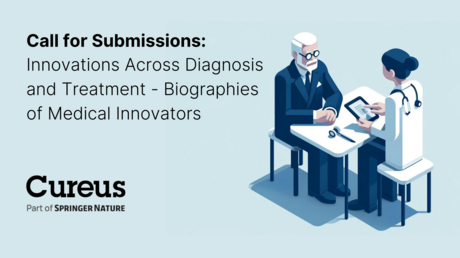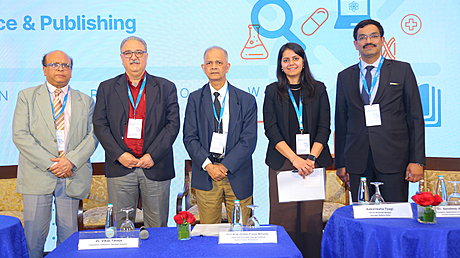Newsroom
Call for Submissions: Highlight Medical Pioneers
The Cureus Journal of Medical Science is thrilled to announce an inspiring call for submissions. As part of our dedication to celebrating the rich history and profound impact of medical professionals, we invite you to contribute biographies or historical vignettes of significant figures in the medical field, particularly those who have mentored generations of physicians. Themes and Topics: We are looking for submissions that not only narrate the lives and achievements of medical pioneers but also the process by which such innovation happened, ultimately highlighting their lasting contribution to human health. Your work will contribute to a collection that honors the legacy of medical heroes. Submission Details & Guidelines: Be sure to choose a person who is a prominent figure in any medical science specialty. It may be a benefit if you have been mentored by or know this figure personally so you can include direct quotes and insights into your review article. Deadline: August 16, 2024 Please review our detailed author guidelines to ensure your submission meets all requirements. How to Submit: Visit our submissions page. Be sure to use the keyword "Historical Vignette" to indicate your participation in this call. All submissions must be Review Articles. We will NOT accept editorials, technical reports, original articles, or case reports for this call for articles. *Please note that all submissions will be required to pay our Preferred Editing fee due to our conditions that apply to Review Articles.
Aug 05, 2024
See examples of past Social Boost performances
Authors who qualify and purchase Social Boost continue to see a major audience increase. *Visit your author dashboard to see if you qualify. The following article was published in February and boosted in May 2021, leading to over 4,000 additional reads, 56 tweets and one news article (with just a premium boost). And to top it off, the article was later cited in the Annals of Internal Medicine. This next article was boosted twice and eventually cited in the International Journal of Molecular Science. The spikes on the chart in December and May directly correlate with the two Social Boosts.
Aug 02, 2024
Cureus Highlighted in Forbes for AI Research
In a recent Forbes article by Shashank Agarwal, the focus was on the critical issue of AI hallucinations and the efforts being made to detect and defeat false positives. An article published in the Cureus Journal of Medical Science received a special mention for publishing pioneering research on this topic. This mention is particularly notable as it showcases the journal's commitment to staying at the forefront of medical and technological advancements. By providing a platform for innovative research on AI and its implications in medicine, Cureus contributes to academic knowledge and may impact practical applications in healthcare. This recognition in a prominent publication like Forbes underscores our journal's influence and the critical nature of the research we publish, reinforcing Cureus's reputation as a leading voice in medical science.
Jun 13, 2024
Springer Nature Champions Open Science and Research Integrity in India
Cureus was recently mentioned by the Times of India: "NEW DELHI: Springer Nature, a leading scientific publisher with over 180 years of history , reaffirms its commitment to open science and research integrity in India. Frank Vrancken Peeters, CEO of Springer Nature Group, highlighted the company's significant role and transformative initiatives within India's research ecosystem... Springer Nature's recent activities include hosting the inaugural Nature Conference on "Nanomaterials in Biomedical Applications" and organizing the Cureus India Medical and Publishing Symposium. 'These events provided valuable platforms for networking and collaboration, significantly advancing the fields of medical science and publishing in India,' said Peeters."
May 21, 2024
Reflecting on the Success of the Cureus India Medical Science & Publishing Symposium
The Cureus India Medical Science & Publishing Symposium 2024 was held on March 7th, 2024 at the Shangri-La Hotel in New Delhi. This landmark event represented a pivotal moment for Open Access healthcare research publishing. With over 100 healthcare CXOs and professionals from prestigious institutions such as AIIMS New Delhi, Max Healthcare, Medanta, Apollo Hospitals, APAR, Fortis, and Manipal Hospitals in attendance, the symposium was a melting pot of ideas, innovations, and insights aimed at advancing the healthcare ecosystem. The symposium included a keynote speech from Dr. B.N. Gangadhar, Chairman of the National Medical Commission (NMC). His address on the healthcare ecosystem underscored the symposium's central theme: leveraging Open Access to propel healthcare research into new frontiers. The discussions, panel interactions, and Q&A sessions were vibrant and insightful, focusing on the critical role of Open Access in disseminating research more effectively to a wider audience. A key highlight was the announcement of a significant partnership between Cureus and SRM University (Medical College). This collaboration underscores SRM University's commitment to excellence and innovation in medical research. This partnership fortifies the journal's mission to promote accessible and sustainable Open Access publishing. The symposium's success was mirrored in the keen interest shown by various institutes, sparking conversations about potential collaborations with Cureus. The event provided an excellent opportunity for medical researchers and clinicians to network. This enthusiasm shown was a testament to the event's impact, broadening the journal's reach within the healthcare community and opening up new avenues for growth and partnership in India. The event also received significant media coverage, with nearly 50 healthcare media houses highlighting the symposium in both online and offline formats. This exposure plays a crucial role in enhancing Cureus's visibility in the Indian healthcare ecosystem, showcasing the symposium's innovative discussions and the broader implications for healthcare research and publishing. Looking ahead, the insights and collaborations born from this symposium promise to shape the future of healthcare research and publishing. As we navigate the evolving landscape of medical science, events like the Cureus India Symposium play a crucial role in fostering innovation, dialogue, and progress. Cureus remains committed to driving forward the conversation on Open Access and its transformative potential for the global healthcare community.
Mar 14, 2024
Cureus India Medical Science & Publishing Symposium: Innovating for Tomorrow
The Cureus Journal of Medical Science, part of the Springer Nature Group, is proud to host the Cureus India Medical Science & Publishing Symposium: Innovating for Tomorrow. Join us for a transformative afternoon of discussions, insights, and networking opportunities that promise to shape the future of healthcare research and publishing. Date: March 7th, 2024 Time: 13:30 to 17:00 IST Location: Shangri-La Hotel, New Delhi This symposium will feature: Keynote addresses by industry authorities Expert panel discussions on the challenges and opportunities in Indian healthcare research and future trends in healthcare publishing. An opportunity to network with peers and leaders over High Tea in the beautiful Shangri-La Hotel. Don’t miss out on this opportunity to be at the forefront of medical science and publishing innovation. If you can’t attend the event, view the livestream here.
Feb 27, 2024











